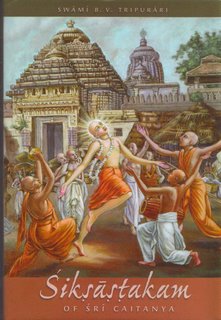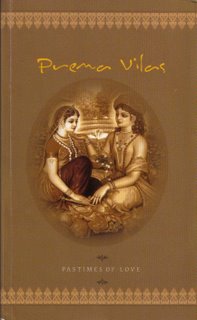 Sri Siksastakam by Swāmi BV Tripurāri
Sri Siksastakam by Swāmi BV Tripurāri
This booklet provides a very nice new elaboration on Mahāprabhu's 8 famous verses, though at various places Swāmījī did get inspired by Traditional Gauḍīya-teachings, notably in his comment on verse 5: On page 85 he makes the point of progressive revelation of the
siddha deha based on SB 11.14.26, quoted from Rāgavartma Candrikā, which was first made on Gauḍīya Discussions a year or so ago. On page 86 he has quoted Narottama's
āpnāra bhajan kothā nā kohibe yathā tathā and
rākho prem hṛdoy bhoriyā, both cornerstone-teachings of Sādhu Bābā, quoted in his biography on my website, and on page 88 he has quoted the point Śrīla Ānanda Gopāla Gosvāmī made in his Vilāpa Kusumāñjali purports that
kiṅkara(ī) means
kiṁ karomi,"what shall I do?" He and a few other IGM
sannyāsīs do have the habit of learning from, getting active support from and even quoting devotees that are considered taboo in their circles, without acknowledging them by name. This in itself is already not very honest, but unfortunately they (I am not sure if Tripurāri Swāmī does this too) sometimes even slam these sources as well, which is really far from proper Vaiṣṇava behaviour.
Interestingly, on page 85 Swāmījī interprets Rāgavartma Candrikā 1.9 to mean that saints, Guru or Supersoul can be alternative sources of the revelation of the
siddha deha ("cultivating an inner spiritual identity"). This provides food for thought, though that is not to be literally found in the original text, nor from the context of the verse. The book does give a balanced and fair presentation of the
siddha deha issue, which also raises questions about Swāmījī's sources, since the
siddha deha-issue is shrouded with mystery, taboo and controversy in his circles. This booklet is fortunately more suitable to a devotee public than some of his previous publications which were clearly targeting the academics. Throughout the booklet Swāmijī gives a nice outline of Rūpa Goswāmī's
rasa-tattva, which is badly needed in the western world.
Swāmī did make a few mistakes though. On page 73 he writes: "Although it is true that despite Kṛṣṇa's being primarily lost in love he nonetheless retains his Godhood and can thus hear the prayers of his
sādhakas, one can legitimately ask at what stage of spiritual practice a
sādhaka's prayers are capable of attracting Kṛṣṇa's personal attention and, furthermore, at what stage a
sādhaka's seva becomes
līlā-sevā, internal
sevā that reaches Kṛṣṇa in his
nitya-līlā. while some may insist that Kṛṣṇa personally listens to the prayers of his
sādhakas at any stage of
sādhana, Thākura Bhaktivinoda says, "The prayers of one who is a
śaraṇāgata are heard by Śrī Nanda- kumāra." As we have already learned,
śaraṇāgati is complete in the stage of
ruci."
Interestingly enough, Tripurāri Svāmi states on page 74 that if one is disheartened by the fact that Kṛṣṇa Himself is not hearing one's prayers, the
sādhaka should take solace in the fact that Mahāprabhu as Visvambhara is Jagadīśa (Paramātma) and Kṛṣṇa Himself. Therefore, the
sādhaka should pray to Mahāprabhu, presumably until he reaches the stage of
ruci when Vrajendranandana Kṛṣṇa Himself reciprocates with his prayers. This (typically Gaura-Kṛṣṇa
bheda-buddhi-) theory cannot be verified independently. It is unacceptable that Kṛṣṇa really would not hear the prayers of anyone else but a surrendered soul. I do not know in which context Bhaktivinode says this (Swāmi quotes a song called
ṣaḍ aṅga śaraṇāgati), it may be meant as a statement of glorification but cannot be accepted as serious theology. Indeed, it is contradicted by the teachings of Viśvanāth Cakravartīpāda in Rāga Vartma Candrikā 2.1. Also, in the very end of the book (p. 128) Swami translates Svarūpa Dāmodara's famous
rādhā bhāva dyuti subalitam naumi krsna svarūpam as 'Pranām to Gaura, who is endowed with Rādhā's countenance and personality'. Here 'Gaura' must be 'Kṛṣṇa'.
Page 73 furthermore contains the controversial statement that '...the
baddha jivas are originally manifest from the Paramātmā', whereas from the Bhagavad Gītā it is clear that the
jīva has no origin since it is beginningless -
na tvevāhaṁ jātu nāsaṁ na tvaṁ neme narādhipāḥ (BG 2.12).
It is not clear what Swāmījī's source is for this theory.
As for the cover design, the artist should have been notified that before 1918 there were no saffron
dhotis in the Gauḍīya Vaiṣṇava sampradāya.
The paragraph starting with 'page 73 furthermore' at the end of this blog is added January 13, 2009.


